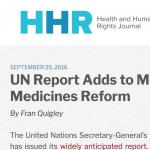Price-gouging anger about drugs like the EpiPen, plus a promising California ballot initiative, and now a strong UN report on access to medicines. Will it all lead to reform of our broken medicines system?
Full disclosure: initially, I was not very excited about the announcement of the convening of the United Nations Secretary-General’s High-Level Panel on Access to Medicines. Every human rights advocate has learned to approach with restraint the news of yet another august group convening to review a crisis.
Such groups can be counted on to issue a wonderful report with promising language. But, almost inevitably, the gauzy, aspirational recommendations in that report are promptly ignored. Worse, in the case of access to medicines, noble but unenforceable calls for reform are reliably bulldozed over by binding trade agreements that elevate corporate profits over human rights.
Part of my job is to work alongside my law students as we represent low-income persons in our Indianapolis-based clinic. Our community does not have a strong public transit system, and many of the available jobs are located far away from where our clients live. Our clients need cars, but they do not have much cash or strong credit ratings. So they turn to the car dealers that populate their neighborhoods, filling concrete lots with shiny vehicles and bright signs promising great cars and forgiving financial terms.



